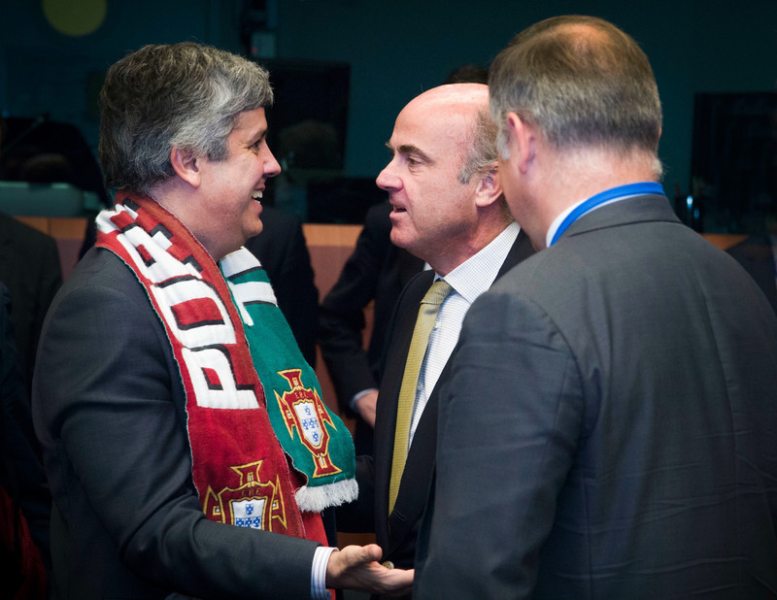Yesterday the European Commission effectively proposed to cancel sanctions against Spain and Portugal foreseen by EU budget rules, subject to the approval of Eurozone governments. While more flexible budget rules are welcome, their reinterpretation must come through transparent negotiations, not behind the closed doors of the Eurogroup.
After putting off a decision multiple times, the European Commission has initiated the next formal step in sanctioning Spain and Portugal for their breaches of Eurozone budget rules. After both countries repeatedly failed to comply with the budget targets set by the Eurozone Member States in the Eurogroup and ECOFIN Council, the Commission – whose duty it is to implement EU law by the letter – had little choice.
The formal declaration of a breach of the budget rules had been postponed a number of times, for overtly political reasons, including to avoid further damaging the conservative caretaker government of Mariano Rajoy ahead of Spanish national elections held late in June. The government in Lisbon is similarly torn between budget discipline and the need to keep the left-wing coalition together.
While the EU rules are far from clear, the deficits of Spain and Portugal are such that no amount of creative fudging could enable Brussels to greenlight the 2016 budgets. This escalation marks the first time that sanctions could have been applied for a failure to comply with the budget rules since the so-called Stability and Growth Pact (SGP) was strengthened in the wake of the Eurozone crisis.
After the Eurogroup/Council adopted the Commission’s recommendation to escalate the Excessive Deficit Procedure against Spain and Portugal in early July, Commissioners Moscovici and Dombrovskis were legally obliged to propose sanctions. As a consequence, the Commission has proposed sanctions of 0% of GDP, saying that higher sanctions – even if legally possible – would be politically and economically inappropriate. Thus, in a move that is ultimately damaging to the credibility of the existing rules, the Commission has effectively refused to sanction Spain and Portugal and has passed the buck to the Council to decide whether to adopt or amend the proposal.
While the Commission’s move had been long expected, the endless delays have already caused tension. President Juncker and Commissioner Moscovici disagree with an interpretation of the budget rules that can lead to more austerity and were keen to avoid sanctions. However, Eurogroup President Dijsselbloem, who is also the Dutch Finance Minister, had sharply criticised President Juncker for insinuating that France could expect light treatment under the budget rules ‘because it is France’. Dijsselbloem’s double-hatting as Dutch finance minister creates conflicts of interest and severely limits his independence in judging Eurozone Member States and in striking a balance between the strict and flexible application of budget rules.
So the ball is in the Eurogroup’s court again – or technically, in the ECOFIN Council’s. But since non-Eurozone members do not vote, that Council configuration looks identical to the (informal) Eurogroup. It can decide to accept a 0% sanction, or increase it to a maximum of 0.2% of GDP as foreseen by the rules (qualified majority voting is required to modify the Commission proposal).
Either way, the decision will be taken by EU Member State governments, after deliberations between Finance Ministers. Diplomatic secrecy has long been accepted in many areas of international politics. But domestic politics, and especially decisions concerning national budgets, which could potentially have a major socio-economic impact on Spain’s and Portugal’s citizens and the ability of governments to deliver on public services, should never be taken in secret negotiations behind the closed doors.
Whatever the outcome this time, it will be achieved behind the closed doors of the Eurogroup, without Portuguese and Spanish citizens knowing which arguments were used by which Member States. Citizens and civil society must be in a position to understand how decisions which affect them are taken and must be able to hold their representatives to account for their actions at EU level.
The saga surrounding the Spanish and Portuguese budgets has highlighted all that is wrong with the budget rules, leading to an incomprehensible situation that harms the governments in question and the credibility of those very budget rules. The EU’s economic governance is in need of deep reform.
In the upcoming reform process, the European Commission’s Expert Group on the deepening of economic and monetary union, and next year’s White Paper, should focus on how to improve the work of the Eurogroup, and how to reform the rules in a way that makes them politically and economically appropriate.






